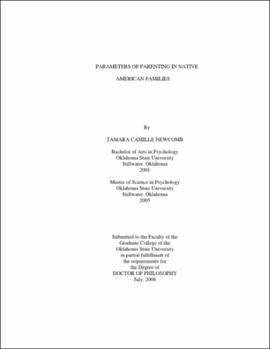| dc.contributor.advisor | Sullivan, Maureen A. | |
| dc.contributor.author | Newcomb, Tamara Camille | |
| dc.date.accessioned | 2013-11-26T08:27:44Z | |
| dc.date.available | 2013-11-26T08:27:44Z | |
| dc.date.issued | 2008-07 | |
| dc.identifier.uri | https://hdl.handle.net/11244/6968 | |
| dc.description.abstract | Scope and Method of Study: This study utilized well-standardized measures and a newly developed measure to collect normative data on parenting styles and strategies of Native American families. The goals of this study were to: 1) provide descriptive information about parenting beliefs, values, practices, changes in parenting styles between two generations, and rates of child problem behavior in a Native American sample where acculturation and basic demographic information were assessed; 2) examine responses on the standardized measures used in this study to determine if they are appropriate to use with a Native American population; 3) examine links between certain parameters that have been found with the dominant culture and examine them in a Native American sample; and 4) examine the influence acculturation had on the relations between parenting strategies and problem behaviors, between parental involvement in teaching life skills to a child and parents' sense of competence, and between the use of noninterference and parents' sense of competence. | |
| dc.description.abstract | Findings and Conclusions: Caregivers in this study reported being highly involved in their children's lives, while also placing value on interdependence/reliance on extended kinship for childrearing assistance. Overall, parents in this sample were confident in their parenting abilities, believed they made good childrearing decisions, and reported low levels of frustration with their children. Further, an emphasis on balancing traditional and dominant culture beliefs and values was found, as well as was strong value placed upon the importance of higher education. Approximately half of the sample reported similar parenting styles as their own parents. Additionally, the results of this study provided tentative support for the use of the ECBI, PS, PSS-Fa/Fr, and PSOC with this group. Based on the results of this study, it appears that a good social support network may be related to decreased use of dysfunctional parenting strategies. Acculturation does not appear to influence the relation between parenting strategies and child problem behavior or the relation between parenting competence and parental involvement in teaching life skills. However, acculturation was found to influence the relation between the use of noninterference and parenting competence. | |
| dc.format | application/pdf | |
| dc.language | en_US | |
| dc.rights | Copyright is held by the author who has granted the Oklahoma State University Library the non-exclusive right to share this material in its institutional repository. Contact Digital Library Services at lib-dls@okstate.edu or 405-744-9161 for the permission policy on the use, reproduction or distribution of this material. | |
| dc.title | Parameters of parenting in Native American families | |
| dc.contributor.committeeMember | Chaney, John | |
| dc.contributor.committeeMember | Leffingwell, Thad | |
| dc.contributor.committeeMember | Hubbs-Tait, Laura | |
| osu.filename | Newcomb_okstate_0664D_2876.pdf | |
| osu.accesstype | Open Access | |
| dc.type.genre | Dissertation | |
| dc.type.material | Text | |
| thesis.degree.discipline | Psychology | |
| thesis.degree.grantor | Oklahoma State University | |
